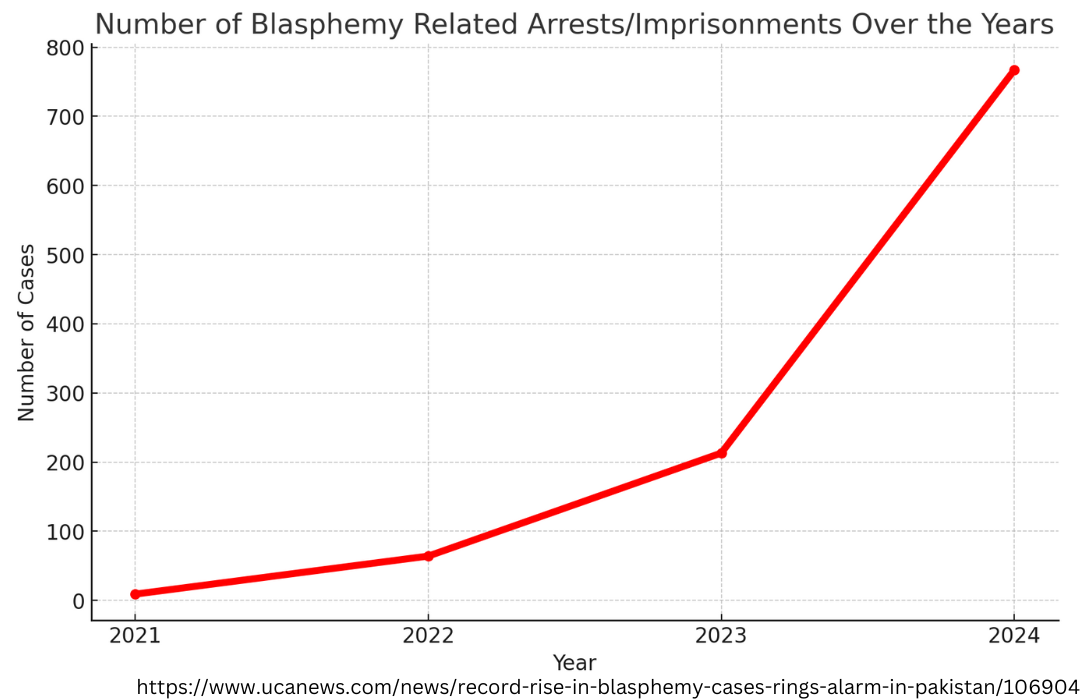Back for more? This Week’s Dispatch Has Arrived
Welcome back. This week our Unbelief Brief brings up an issue of hate speech persecuted as blasphemy, along with staggering new statistics on blasphemy-related arrests and imprisonments in Pakistan.
EXMNA Insights discusses World Adoption Day and the place that adoption has, or doesn’t, in Islam.
Finally, our Persecution Tracker takes us to Malaysia and Pakistan.
Unbelief Brief

A recent case in Malaysia highlights ongoing global concerns surrounding blasphemy laws and freedom of expression. A man was arrested after sharing a one-minute video on social media in which he made remarks considered insulting to Islam and suggested violence against Muslims. Authorities subsequently hospitalized him for undisclosed "mental health treatment". The reason this case is of particular interest is that rather than charge the man for inciting violence against Muslims, Malaysian authorities chose instead to charge him with blasphemy against Islam. This raises serious questions about how authorities claim to balance ensuring public safety with safeguarding religious sentiments in contexts where blasphemy remains criminalized.
In Pakistan, a report from the National Commission for Human Rights reveals a significant increase in blasphemy-related arrests and imprisonments, pointing to a dramatic escalation over the past year. According to the report, 767 individuals were detained on blasphemy charges by mid-year—a marked increase from 213 in 2023, 64 in 2022, and 9 in 2021.

High-profile incidents continue to fuel concern over the country's strict blasphemy laws and their impact on religious freedom. Recent such incidents include an elderly widow’s eviction after her son was accused of blasphemy, exemplifying the wide-reaching social and legal ramifications for people accused of blasphemy. Civil society efforts to address these issues include the work of organizations like the Alliance Against Blasphemy Politics, which recently held film screenings in Karachi to raise awareness of the laws’ impact. Yet, amid increasing cases, there is a prevailing concern that conditions for religious minorities may be worsening.Beyond blasphemy-related issues, religious minorities in Pakistan face additional challenges, including forced conversions and marriages. In a recent case, Shakeel Masih, a Christian father, was arrested after attempting to protect his 13-year-old daughter, Roshani Shakeel, from a forced marriage. Local officials forced her conversion to Islam and then falsely registered the marriage with her abductor, claiming she was the legal marriageable age of 18. Roshani then escaped and returned to her father after overhearing one of her abductors planning to sell her into sexual slavery. Following her escape, authorities reportedly sided with the abductors, putting pressure on Masih to disclose Roshani’s location so she could be returned to her “husband”. This case underscores the vulnerabilities that religious minorities face in Pakistan, where such incidents contribute to ongoing concerns over minority rights and legal protections.
EXMNA Insights
World Adoption Day, observed on November 9, highlights the importance of family structures that provide stability and a sense of permanency for children in need. In contrast, Islam discourages formal adoption, a stance that has widespread negative impacts on child welfare. This prohibition, rooted in the Quran and the life of Muhammad, severely limits the opportunities for vulnerable children to experience a stable family environment. Muhammad initially adopted Zayd ibn Harithah, who became known as Zayd ibn Muhammad. Later, however, he annulled this adoption, citing a divine revelation recorded in Surah Al-Ahzab (33:4-5): “Nor has He made your adopted sons your sons.” This verse establishes that adopted children cannot be assimilated into the family lineage, effectively ending formal adoption in Islam.The catalyst for this prohibition is directly linked to Muhammad’s desire to marry Zaynab bint Jahsh, Zayd’s former wife. His marriage to Zaynab, referenced in Surah Al-Ahzab (33:37), introduced the ruling that adopted sons should not be considered as biological sons. This effectively permitted Muhammad’s marriage to Zaynab and set a precedent against treating adopted children as part of the family line, depriving adopted children of the sense of permanency and connection that formal adoption offers. Instead, Islam prescribes kafala, a guardianship system that provides some care but lacks the legal and emotional depth of adoption. This system also varies widely in practice across the Muslim world, leaving orphans and vulnerable children at the mercy of their respective judicial systems and negatively impacting a child’s sense of security.Another contentious practice is “milk kinship,” where breastfeeding establishes non-biological kinship ties. Muhammad used this practice to create loopholes around family relationships and interactions. In a Sahih Muslim hadith (8:3425), he encouraged a grown man, Salim, to drink breast milk from his adoptive mother so that he would become her mahram, or unmarriageable kin. This workaround is not only perverse but also impractical and lacks the depth of stable family bonds that adoption would provide.Ultimately, Islam’s prohibition on adoption appears more reflective of Muhammad’s sexual desires than any genuine concern for lineage or family integrity. By forbidding formal adoption, he allowed for a marriage that otherwise would have faced social reproach while limiting opportunities for vulnerable children to experience the stability, belonging, and security of a family.
Persecution Tracker Updates
Full accounts of the recent blasphemy investigation in Malaysia mentioned above, as well as the evicted Pakistani widow and her son, can be found on our Persecution Tracker here and here, respectively.
Until next week,
The Team at Ex-Muslims of North America
P.S. We’d love to hear from you! Share your feedback at [email protected].


